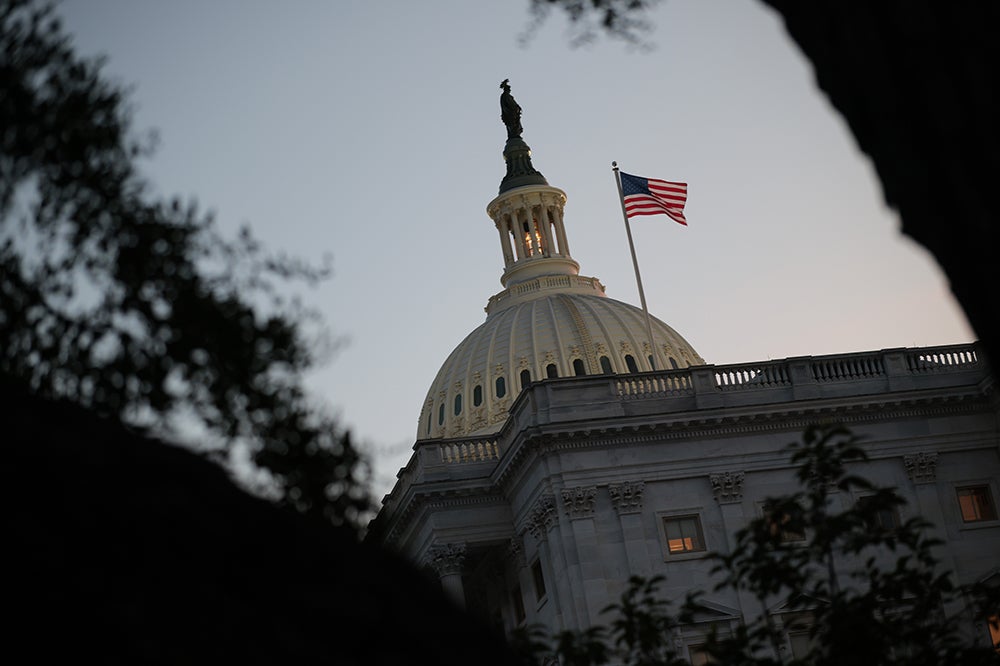As Reconciliation Bill Heads to the Senate, Voters Deeply Concerned about Adding Trillions in Debt
Overwhelming Bipartisan Majorities Believe Moody’s Downgrade of U.S. Credit Makes Addressing National Debt More Urgent
The U.S. Fiscal Confidence Index Falls for Third-Straight Month to 52 in May (100 is Neutral)
Following the recent U.S. credit downgrade by Moody’s, overwhelming majorities of voters are deeply concerned about the path of our national debt, and fiscal effects of the current budget reconciliation bill. Now that all three independent agencies have downgraded U.S. debt below their top ratings, a new survey from the Peter G. Peterson Foundation shows that voters are urging lawmakers to heed this warning as they consider legislation that would add trillions to the already unsustainable national debt. Against this backdrop, the U.S. Fiscal Confidence Index fell for the third-straight month to 52 (100 is neutral), with Democrats, independents and Republicans all calling for making the debt a more urgent priority.
Results of this new survey, jointly conducted by Democratic firm Global Strategy Group and Republican firm North Star Opinion Research, include:
- 80% of voters agree that Moody’s U.S. credit rating downgrade makes addressing the national debt a more urgent priority (82% of Democrats/77% of independents/80% of Republicans).
- Following the downgrade, 84% of voters say they are concerned that the budget bill under consideration by Congress would add trillions of dollars to the national debt (90% of Democrats/83% of independents/78% of Republicans).
- 87% of voters agree lawmakers should take the new lower U.S. credit ratings into account as they consider the fiscal impact of this year’s budget legislation (91% of Democrats/85% of independents/84% of Republicans).
More broadly, according to the May U.S. Fiscal Confidence survey, 76% of voters are urging the president and Congress to make addressing the debt a top priority, including 67% of Democrats and 71% of independents and 89% of Republicans.
“Voters understand that the Moody’s downgrade is not a good sign, and adding more trillions to our national debt with new legislation would only take things in the wrong direction,” said Michael A. Peterson, CEO of the Peter G. Peterson Foundation. “The fact that all three rating agencies have now downgraded America’s credit reflects the dangerous debt cycle we’re in, with growing deficits and rising interest rates leading to ever more debt. Given that we’re already on pace to add $22 trillion to the national debt over the next decade, the budget bill should certainly not make the fiscal path even worse. Voters and financial markets are increasingly concerned about America’s fiscal situation, so our lawmakers should be as well.”
A national poll last month found that 88% of voters, including 92% of Democrats, 89% of Independents and 84% of Republicans, are concerned that a budget bill adding $29 trillion to the national debt over the next 10 years will increase inflation, interest rates and consumer borrowing costs.
The Fiscal Confidence Index measures public opinion about the national debt by asking six questions in three key areas:
- CONCERN: Level of concern and views about the direction of the national debt.
- PRIORITY: How high a priority addressing the debt should be for elected leaders.
- EXPECTATIONS: Expectations about whether the debt situation will get better or worse in the next few years.
The survey results from these three areas are weighted equally and averaged to produce the Fiscal Confidence Index value. The Fiscal Confidence Index, like the Consumer Confidence Index, is indexed on a scale of 0 to 200, with a neutral midpoint of 100. A reading above 100 indicates positive sentiment. A reading below 100 indicates negative sentiment.
Fiscal Confidence Index Key Data Points:
- The May 2025 Fiscal Confidence Index value is 52. (The April 2024 value was 54. The March 2025 value was 59. The February value was 62.)
- The current Fiscal Confidence Index score for CONCERN about the debt is 46, indicating deep concern about the debt. The score for debt as a PRIORITY that leaders must address is 29, indicating that Americans want elected leaders to make addressing long-term debt a high priority. The score for EXPECTATIONS about progress on the debt is 81. The Fiscal Confidence Index is the average of these three sub-category scores.
This online poll surveyed 1,001 registered voters nationwide between May 19 and May 21, 2025. It has a margin of error of +/- 3.1%.
Detailed results can be found online at www.pgpf.org/FiscalConfidenceIndex.
###
ABOUT THE PETER G. PETERSON FOUNDATION
The Peter G. Peterson Foundation is a nonprofit, nonpartisan organization that is dedicated to increasing public awareness of the nature and urgency of key fiscal challenges threatening America's future, and to accelerating action on them. To address these challenges successfully, we work to bring Americans together to find and implement sensible, long-term solutions that transcend age, party lines and ideological divides in order to achieve real results. To learn more, please visit www.pgpf.org.
Further Reading
New Report: National Debt Outlook Gets Worse as Interest Costs Exceed $1 Trillion Annually
A new CBO report shows that the national debt outlook worsened from last year’s projections.
What Are Refundable Tax Credits?
The cost of refundable tax credits has grown over the past several years, with the number and budgetary impact of the credits increasing.
The Six Largest Corporate Tax Expenditures
Relative to the size of the economy, the U.S. collects less revenues than many other advanced countries. Tax breaks are a contributing reason.


